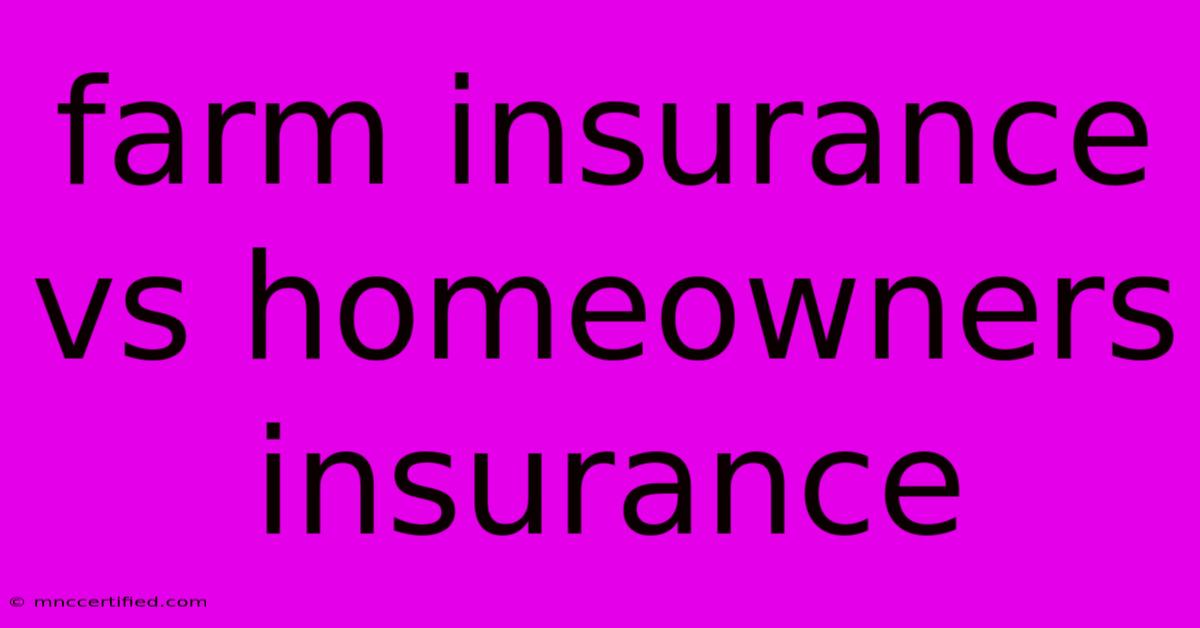Farm Insurance Vs Homeowners Insurance

Table of Contents
Farm Insurance vs. Homeowners Insurance: Which One Do You Need?
Owning a farm or a homestead comes with unique risks and responsibilities. While a standard homeowners insurance policy might seem like a good fit, it often falls short in protecting the unique aspects of your rural property. This is where farm insurance steps in, offering comprehensive coverage tailored to the specific needs of farmers and landowners.
But how do these two insurance types differ? And how can you determine which one is right for you? Let's delve into the distinctions between farm insurance and homeowners insurance to help you make an informed decision.
Understanding the Differences
Homeowners insurance is designed to protect your primary residence and its contents from common risks like fire, theft, and natural disasters. It typically includes coverage for:
- Dwelling: Your home's structure and attached structures like garages and decks.
- Personal Property: Your belongings inside the home, including furniture, electronics, and clothing.
- Liability: Protects you from financial losses if someone is injured on your property.
Farm insurance, on the other hand, is a broader and more specialized policy that encompasses a wide range of risks specific to agricultural operations. It often includes coverage for:
- Dwelling and Other Farm Structures: Covers your farmhouse, barns, silos, sheds, and other buildings on your property.
- Farm Equipment: Protects tractors, combines, trucks, and other agricultural machinery.
- Livestock: Provides protection for your animals, including horses, cattle, pigs, and poultry.
- Crops: Offers coverage against damage to your crops due to weather events, pests, or diseases.
- Liability: Protects you from legal claims arising from farm-related accidents.
Why Farm Insurance is Crucial
While homeowners insurance might cover some aspects of your farm, it won't adequately address the unique risks associated with agricultural operations. Consider these factors:
- Specialized Needs: Farm insurance provides tailored coverage for valuable farm equipment, livestock, and crops, which homeowners insurance typically doesn't.
- Higher Risk Exposure: Farm properties are exposed to a wider range of risks, including unpredictable weather, animal diseases, and agricultural accidents.
- Limited Coverage: Homeowners insurance often has specific exclusions for farm-related activities, limiting your protection.
Deciding Which One is Right for You
The choice between farm insurance and homeowners insurance depends on your specific situation. Ask yourself these questions:
- Do you own livestock or farm animals?
- Do you operate agricultural machinery or equipment?
- Do you grow crops for commercial purposes?
- Is your property primarily used for agricultural activities?
If you answered yes to any of these questions, you likely need farm insurance. However, if your property is primarily residential and you don't engage in significant agricultural activities, homeowners insurance might be sufficient.
Seeking Professional Guidance
Ultimately, the best way to determine the right insurance for your needs is to consult with an insurance agent specializing in farm insurance. They can assess your specific risks, advise you on the appropriate coverage options, and help you find a policy that meets your unique requirements.
Conclusion
Choosing the right insurance is essential for protecting your valuable assets and ensuring peace of mind. While homeowners insurance might seem like a suitable option at first, farm insurance offers the comprehensive coverage you need to safeguard your agricultural operations. By understanding the differences and considering your specific needs, you can make an informed decision that protects your property and your financial well-being.

Thank you for visiting our website wich cover about Farm Insurance Vs Homeowners Insurance. We hope the information provided has been useful to you. Feel free to contact us if you have any questions or need further assistance. See you next time and dont miss to bookmark.
Featured Posts
-
Have I Got News For You Tonights Panel
Nov 09, 2024
-
Cold Email Template Investment Banking
Nov 09, 2024
-
Nicole Scherzinger Responds To Russell Backlash
Nov 09, 2024
-
What Do You Need When Trading In A Car
Nov 09, 2024
-
Can You Sue After Insurance Settlement
Nov 09, 2024